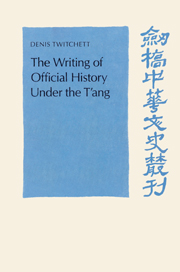Book contents
- Frontmatter
- Contents
- Preface
- Conventions
- List of abbreviations
- Part I The bureaucratic apparatus
- Part II The compilation of the historical record
- 3 Introduction
- 4 The Court Diaries (Ch'i-chü chu)
- 5 The Inner Palace Diary (Nei Ch'i-chü chu)
- 6 The Record of Administrative Affairs (Shih-cheng chi)
- 7 The Daily Calendar (Jih-li)
- 8 Biographies
- 9 Histories of institutions, historical encyclopedias, and collections of documents
- 10 The Veritable Records (Shih-lu)
- 11 The National History (Kuo shih)
- Part III The Chiu T'ang shu
- Appendix: Derivation of the Basic Annals chapters of Chiu T'ang shu
- Bibliography
- Index
6 - The Record of Administrative Affairs (Shih-cheng chi)
Published online by Cambridge University Press: 03 November 2009
- Frontmatter
- Contents
- Preface
- Conventions
- List of abbreviations
- Part I The bureaucratic apparatus
- Part II The compilation of the historical record
- 3 Introduction
- 4 The Court Diaries (Ch'i-chü chu)
- 5 The Inner Palace Diary (Nei Ch'i-chü chu)
- 6 The Record of Administrative Affairs (Shih-cheng chi)
- 7 The Daily Calendar (Jih-li)
- 8 Biographies
- 9 Histories of institutions, historical encyclopedias, and collections of documents
- 10 The Veritable Records (Shih-lu)
- 11 The National History (Kuo shih)
- Part III The Chiu T'ang shu
- Appendix: Derivation of the Basic Annals chapters of Chiu T'ang shu
- Bibliography
- Index
Summary
The insufficiency of the Ch'i-chü chu as an adequate record of government business with its bare record of proceedings in open court, was felt very early. In the reign of T'ai-tsung (626-49), relations between the emperor and his chief ministers were unusually close, and many crucial decisions and discussions of policy took place during their private meetings, not in the full court assembly in the presence of the diarists. The need for a record of these deliberations was met by having one of the court diarists keep a record of these more private discussions. Under T'ai-tsung's successor, Kao-tsung, however, the emperor ceased to be the dominant force in decision making, and even the record of his meeting with his ministers provided no account of many important decisions. When the elder statesmen who had previously served his father died or were driven from office in the mid 650s, the new chief ministers, Hsu Ching-tsung and Li I-fu, wishing to conceal their blatant political manipulations, forbade the attendance of the diarists at the informal meetings of the chief ministers, which henceforth left no formal record. From this time on, the diarists only “heard the instructions issued by by the emperor in the presence of the guards and had no knowledge of the deliberations carried on after the withdrawal of the court.”
- Type
- Chapter
- Information
- The Writing of Official History under the T'ang , pp. 51 - 56Publisher: Cambridge University PressPrint publication year: 1992



